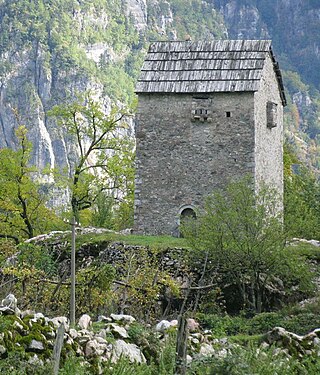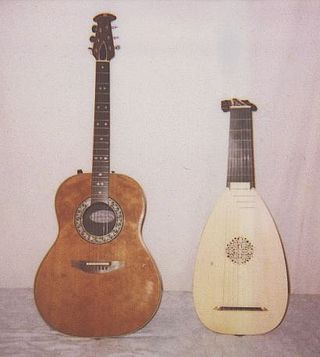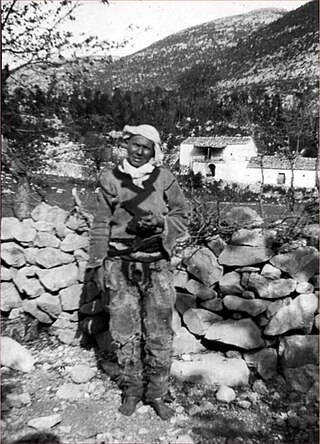
The Hanafi school or Hanafism is one of the four major schools of Islamic jurisprudence within Sunni Islam. It was established by the 8th-century scholar, jurist, and theologian Abu Hanifa, a follower whose legal views were primarily preserved by his two disciples Abu Yusuf and Muhammad al-Shaybani. As the oldest and most-followed of the four major Sunni schools, it is also called the "school of the people of opinion". Many Hanafis also follow the Maturidi school of theology.
AB, Ab, or ab may refer to:

The qanun, kanun, ganoun or kanoon is a Middle Eastern string instrument played either solo, or more often as part of an ensemble, in much of Iran, Arab East, and Arab Maghreb region of North Africa, later it reached West Africa, Central Asia due to Arab migration. It was also common in ancient Armenia, and Greece. The name derives ultimately from Ancient Greek: κανών kanōn, meaning "rule, law, norm, principle". The qanun traces one of its origins to a stringed Assyrian instrument from the Old Assyrian Empire, specifically from the nineteenth century BC in Mesopotamia. This instrument came inscribed on a box of elephant ivory found in the old Assyrian capital Nimrud. The instrument is a type of large zither with a thin trapezoidal soundboard that is famous for its unique melodramatic sound.
The Kanun is a set of Albanian traditional customary laws, which has directed all the aspects of the Albanian tribal society.

In traditional Albanian culture, Gjakmarrja or hakmarrja ("revenge") is the social obligation to kill an offender or a member of their family in order to salvage one's honor. This practice is generally seen as in line with the social code known as the Canon of Lekë Dukagjini or simply the Kanun. The code was originally a "a non-religious code that was used by Muslims and Christians alike."

The Constitution of the Ottoman Empire was in effect from 1876 to 1878 in a period known as the First Constitutional Era, and from 1908 to 1922 in the Second Constitutional Era. The first and only constitution of the Ottoman Empire, it was written by members of the Young Ottomans, particularly Midhat Pasha, during the reign of Sultan Abdul Hamid II. After Abdul Hamid's political downfall in the 31 March Incident, the Constitution was amended to transfer more power from the sultan and the appointed Senate to the popularly-elected lower house: the Chamber of Deputies.

Plucked string instruments are a subcategory of string instruments that are played by plucking the strings. Plucking is a way of pulling and releasing the string in such a way as to give it an impulse that causes the string to vibrate. Plucking can be done with either a finger or a plectrum.
The present Constitution of the Republic of Albania was adopted by the Parliament of Albania on 21 October 1998 and certified by presidential decree on 28 November 1998, following a public referendum which approved the new Constitution. It is split up over many different acts. The document succeeded the 1976 Constitution, originally adopted at the creation of the People's Socialist Republic of Albania on 28 December 1976 and heavily amended on 29 April 1991.
Zhulat is a village in Southern Albania. It is part of the former Cepo municipality. As part of the 2015 local government reform, it became part of the municipality Gjirokastër. The village is inhabited by Muslim Albanians. Papa Zhuli a Catholic priest who is credited for the Kanun of Labëria, is said to be from Zhulat which can be seen from his surname Zhuli. He moved from Zhulat to Labëria.

Balkan sworn virgins are people who are assigned female at birth and who take a vow of chastity and live as men in patriarchal northern Albanian society, Kosovo and Montenegro. To a lesser extent, the practice exists, or has existed, in other parts of the western Balkans, including Bosnia, Dalmatia (Croatia), Serbia and North Macedonia.
Besa is an Albanian cultural precept, usually translated as "faith" or "oath", that means "to keep the promise" and "word of honor". The concept is synonymous, and, according to Hofmann, Treimer and Schmidt, etymologically related, to the Classical Latin word fides, which in Late Ancient and Medieval Latin took on the Christian meaning of "faith, (religious) belief" today extant in Romance languages, but which originally had an ethical/juridical scope. The Albanian adjective besnik, derived from besa, means "faithful", "trustworthy", i.e. one who keeps his word. Besnik for men and Besa for women continue to be popular names among Albanians. Besa is of prime importance in the Albanian traditional customary law (Kanun) as a cornerstone of personal and social conduct.
The Massacre of the Albanian beys occurred on 9 August 1830, when around 500 Albanian leaders (beys) and their personal guards were killed by Ottoman forces in the town of Manastir. The massacre led to the weakening of the power of the beys of southern Albania and also set the basis for the destruction of the powerful northern Albanian Pashalik of Scutari.
Marie Amelie Julie Anna, Baroness von Godin, sometimes written as Maria Amalia, was a Bavarian women's rights activist, translator and Albanologist.
Qanun is an Arabic term that refers to laws established by Muslim sovereigns, especially the body of administrative, economic and criminal law promulgated by Ottoman sultans. It is used to contrast with sharia, the body of law elaborated by Muslim jurists. It is thus frequently translated as "dynastic law."

The Albanian tribes form a historical mode of social organization (farefisní) in Albania and the southwestern Balkans characterized by a common culture, often common patrilineal kinship ties and shared social ties. The fis stands at the center of Albanian organization based on kinship relations, a concept that can be found among southern Albanians also with the term farë.

The Ottoman Empire was governed by different sets of laws during its existence. The Qanun, sultanic law, co-existed with religious law. Legal administration in the Ottoman Empire was part of a larger scheme of balancing central and local authority. Ottoman power revolved crucially around the administration of the rights to land, which gave a space for the local authority develop the needs of the local millet. The jurisdictional complexity of the Ottoman Empire was aimed to permit the integration of culturally and religiously different groups.

The first women's association in Albania was founded in 1909. Albanian women from the northern Gheg region resided within a conservative and patriarchal society. In such a traditional society, the women had subordinate roles in Gheg communities that believe in "male predominance". This is despite the arrival of democracy and the adoption of a free market economy in Albania, after the period under the communist Party of Labour. Traditional Gheg Albanian culture was based on the 500-year-old Kanun of Lekë Dukagjini, a traditional Gheg code of conduct, where the main role of women was to take care of the children and to take care of the home.

The province of Aceh in Indonesia enforces some provisions of Islamic criminal law, the sole Indonesian province to do so. In Aceh, Islamic criminal law is called jinayat. The laws that implement it are called Qanun Jinayat or Hukum Jinayat, roughly meaning "Islamic criminal code". Although the largely-secular laws of Indonesia apply in Aceh, the provincial government passed additional regulations, some derived from Islamic criminal law, after Indonesia authorized the province to enact regional regulations and granted Aceh special autonomy to implement Islamic law. Offences under the provisions include alcohol consumption, production and distribution, gambling, adultery, rape, sexual harassment, certain intimacies outside marriage, and certain homosexual acts. Punishments include caning, fines, and imprisonment. There is no provision for stoning; an attempt to introduce it in 2009 was vetoed by Governor Irwandi Yusuf. In 2016 Aceh processed 324 first instance court cases under Islamic criminal law, and carried out at least 100 caning sentences.
The Traditions of Albania refers to the traditions, beliefs, values and customs that belong within the culture of the Albanian people. Those traditions have influenced daily life in Albania for centuries and are still practiced throughout Albania, Balkans, and Diaspora. The Albanians have a unique culture, which progressed over the centuries through its strategic geography and its distinct historical evolution.
Hiṭia, alternatively known as Kanun, is the eleventh month of the Mandaean calendar. The first day of the month is Dehwa Daimana, the birthday of John the Baptist.









